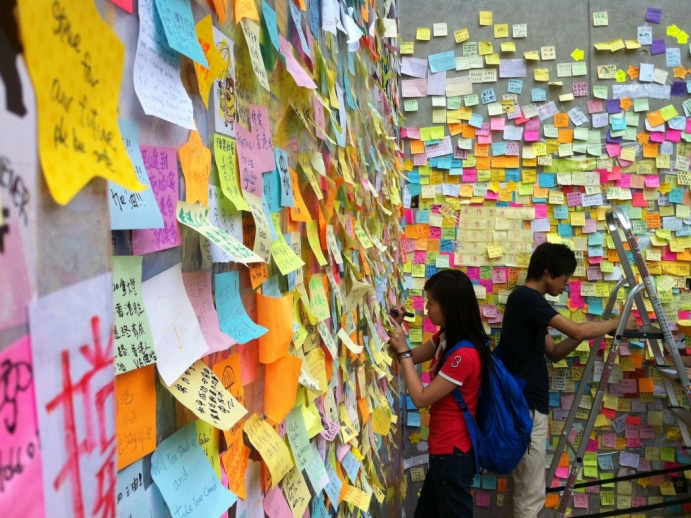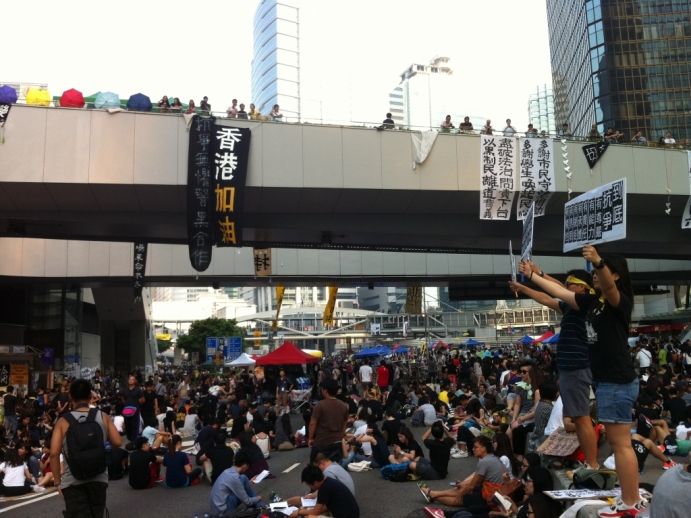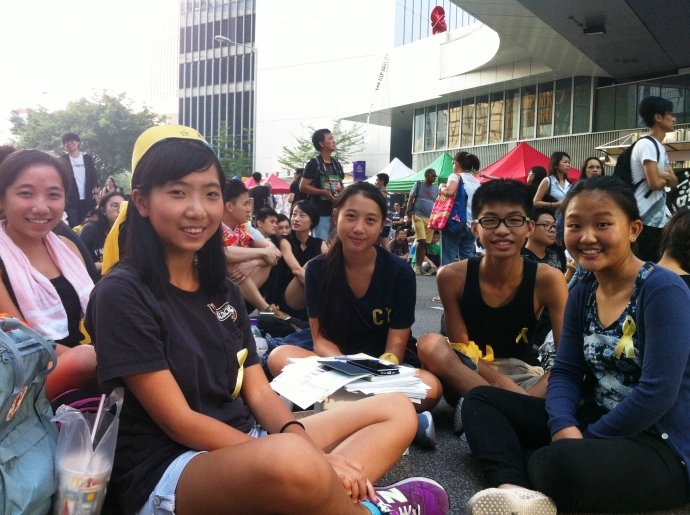A new 'extracurricular' for Hong Kong students: (left) Yuki Shek, Kathy Tse, Josephine Lam, Kelvin Lai and Kary Choi
Story and Photos By David Kumagai, 3L
Four teenage girls sit in the middle of a major Hong Kong highway. Wearing yellow ribbons and yellow headbands, they bury themselves in textbooks as crowds line the barricaded roads.
This little band of protesters, aged 16 and 17, has joined thousands of others to occupy Hong Kong’s financial district, clog the city’s main arteries, and defy Beijing.
Protesting has become their newest extracurricular.
“We’ve come every day after school, and we will remain until the government comes out and answers our questions,” said 17-year-old Yuki Shek.
“We want fair elections,” said Kathy Tse, 16.
It has been a remarkably peaceful display of youth in revolt, a standoff pitting teens like Kathy and Yuki against a Goliath known for crushing civil unrest.
The protests, dubbed the “Umbrella Revolution”, seek to ensure universal suffrage for the chief executive election—akin to a mayoral vote—in 2017 and the Legislative Council elections in 2020. On August 31, Beijing frustrated many Hong Kong residents when it announced that only Communist Party loyalists would be eligible to run for Hong Kong’s municipal offices. The protesters want open elections.
“The level of civic engagement is really impressive and really brave,” said Ian Li, a University of Toronto law student on exchange at the University of Hong Kong.
Li, whose family is from Hong Kong, has visited the city many times, and said he was proud of the sense of unity at the protests.
"Hong Kong is the only place in China where you can recognize Tiananmen Square, and so this is still fresh in their minds and yet they’re still standing up and fighting for what they believe in,” he said.

Messages of support for the protesters
Minimal violence
It has not been entirely peaceful. Police were widely condemned for using tear gas and pepper spray on nonviolent protesters last week. The crackdown is what led protesters to start carrying umbrellas for protection.
On Friday and Saturday, minor disputes arose between protesters and some residents who voiced frustrations at the disruption to their businesses. However, various reports suggest that some of these apparent backlashes have been orchestrated by triads.
In the span of one hour on Saturday in Mong Kok, a dense shopping district, more than five small altercations broke out between protesters and those opposed to the demonstrations. One woman wielding a pair of scissors tried to cut down a banner hanging across the road. Protesters surrounded the woman, and within minutes police came to remove her from the scene.
At each of these mini disputes, the protesters drowned out their opposition with chants of “Your work is done”, implying they were hired to provoke conflict.
Statutory interpretation
Ultimately, the protests are about two competing interpretations of Hong Kong’s constitution, known as the Basic Law.
Article 45 of the constitution states that Hong Kong’s chief executive should eventually be chosen “by universal suffrage upon nomination by a broadly representative nominating committee in accordance with democratic procedures.”
However, Beijing announced on August 31 that potential candidates must win majority approval from the committee, and signaled that the committee would closely resemble that which chooses the chief executive at present. Effectively, only Beijing loyalists will be on the ballot. The protesters say Article 45 entitles them to open candidacy that follows “international standards” for democratic elections.

Protesters in the Admiralty neighbourhood of Hong Kong, October 5, 2014
Waiting game
Thus far, it seems that Beijing is waging a war of attrition on the protesters. And it may be working.
"Speaking to local students, they are exhausted,” Li said. The occupy protests began on September 28 and are entering their second week. “Classes are still going on and they’re making a big sacrifice,” he explained. “Students are getting frustrated.”
The police threatened to clear people from the three main protest areas in Admiralty, Mong Kok and Causeway Bay by Sunday evening. University of Hong Kong President Peter Mathieson sent an email on Sunday afternoon urging “all HKU students and staff to leave all protest areas immediately” because of a “risk to your safety.”
However, despite warnings of a crackdown, many protesters remain planted along Hong Kong’s major roadways, and the police’s vow to remove protesters has yet to materialize.
Life goes on
Aside from the three main protest sites, it is difficult to notice a change in day-to-day life in Hong Kong.
Max Mandel, another University of Toronto law student on exchange in Hong Kong, said he has been reassuring his family members in Toronto that life in Hong Kong remains calm.
“My parents just wanted to make sure I was staying clear of any dangerous situations,” Mandel said. “I told them that I was safe, and that there was nothing to be worried about. I've really never felt unsafe.”
As for Kathy and Yuki, the teens at the fore of the movement, they’re determined to wait for concessions from the government.
“We’re a little nervous, but we’ll keep coming back,” Yuki said.
Brief History of Hong Kong Governance
- Modern Hong Kong has never enjoyed democracy.
- Under British rule, the colonial governors were chosen by London.
- Britain returned the territory to China in 1997 under a policy of “one country, two systems”, designed to ensure Hong Kong retained a capitalist economy and its common law legal system, in addition to other rights not enjoyed on the Chinese mainland, such as free speech, a free press and freedom of assembly.
- Since China retook control, Hong Kong’s leaders have been picked by an elite committee loyal to the country’s governing regime. In 2007, Beijing announced that it would allow universal suffrage to take effect in the 2017 Hong Kong elections. However, Beijing’s latest decision means—according to the protesters—that only Beijing-loyalists will be eligible to stand for office.



